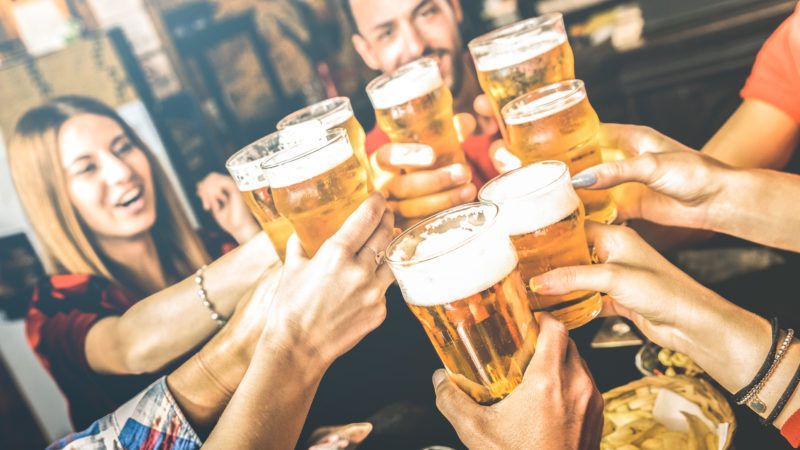Wisconsin May Allow Bars To Stay Open Late for the Democratic National Convention—Why Not Always?
If cities will accommodate huge numbers of visitors, why not extend the courtesy to locals?

A Wisconsin proposal to allow bars across the state to stay open late during the Democratic National Convention (DNC) in Milwaukee in July looks likely to become law.
"The plan would let municipalities statewide extend closing hours until 4:00 a.m. from July 13 to July 17," Wisconsin Public Radio reported this week. "Without the change, bars and restaurants would have to close when they normally do at 2:00 a.m."
That's great. But if it's a good idea to let bars choose to stay open late for a few days in July—and it is—then it's also a good idea every other day of every other month, too.
Wisconsin is, by most measures, one of America's booziest states. It has one of the highest rates of per-capita alcohol consumption. Ten of the top 20 "drunkest" cities and towns in the country are located in Wisconsin.
It's also the only state where people of any age may legally consume alcohol in a bar or restaurant, provided any minor is with a parent, guardian, or spouse who's at least 21 and the business agrees to serve the under-21 drinker.
But Wisconsin also has a prohibitionist streak. The Wisconsin Alcohol Policy Project, an anti-alcohol policy project based at the University of Wisconsin Law School, has made it its mission to "improve the alcohol environment" by—you probably guessed—making alcohol less available, less attractive, and less affordable.
Interestingly, some version of the DNC alcohol story seems to pop up during nearly every presidential election cycle.
In 2012, lawmakers in North Carolina, which hosted the DNC Convention that year, loosened booze rules temporarily "to ensure booze flows freely" during the convention.
Four years later, in advance of the DNC in Philadelphia, Pennsylvania relaxed its alcohol rules somewhat for "event[s] directly connected to the convention… and convention attendees."
"If freedom from… the ability to sell alcohol past 2 a.m. is a good thing for the Democratic convention, why not allow average Pennsylvanians the same liberty?" PJ Media's Tyler O'Neil wrote in response to the plan.
Cleveland, which hosted the GOP Convention in 2016, also temporarily relaxed its rules to allow some taverns and pubs to stay open late during the convention.
America has a long and grand history of drunkenness at and around political conventions. As Barbara Holland relates in her wonderful book The Joy of Drinking, one of America's first conventions, the Constructional Convention in 1787, which also took place in Philadelphia, saw the 55 delegates gather in a tavern one night and consume "54 bottles of Madeira, 60 bottles of claret, 8 of whiskey, 22 of port, 8 of hard cider and 7 bowls of punch so large that, it was said, ducks could swim around in them."
Relaxing regulations to accommodate drinkers might be a modern phenomenon, then, but it isn't confined to political conventions. Big national sporting events, for example, often spur some sort of relaxation of local drinking rules.
Clemson, South Carolina, home to the university of the same name, relaxed its alcohol rules when the school played in the national college football championship last month. Ft. Lauderdale, Fla., a stone's throw from last month's Super Bowl venue, also relaxed its alcohol rules for the big game.
All this regulatory relaxation seems arbitrary, selective, and superfluous. If it's a good idea to relax rules for alcohol consumption when tens of thousands of thirsty outside visitors are expected to gather in a city and drink alcohol, then why not let the locals take advantage of those same rules all year long?
Punish irresponsible drinkers—such as drunk drivers—whose actions do or might harm others. But let responsible adults drink when, where, and what they want to.
